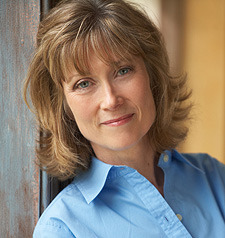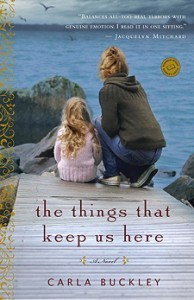The Things That Keep Us Here: An Interview with Author Carla Buckley
 I've met some of my favorite people at booksignings and writer's conferences. Sometimes the meetings are accidental. We're paired at tables–the way I met and became friends with the fabulous Sandra Dallas. Or we're on a panel together–the way I met delightful Julie Compton. In November, at the day long Buckeye Book Fair, my signing table was right beside Carla Buckley's. Although we were both happy to meet and greet readers, we also found time to chat. When she told me her debut novel was about a flu pandemic, I snapped it up. I'll confess to loving books about a variety of people caught up in a singular catastrophic event. I knew I had to have it.
I've met some of my favorite people at booksignings and writer's conferences. Sometimes the meetings are accidental. We're paired at tables–the way I met and became friends with the fabulous Sandra Dallas. Or we're on a panel together–the way I met delightful Julie Compton. In November, at the day long Buckeye Book Fair, my signing table was right beside Carla Buckley's. Although we were both happy to meet and greet readers, we also found time to chat. When she told me her debut novel was about a flu pandemic, I snapped it up. I'll confess to loving books about a variety of people caught up in a singular catastrophic event. I knew I had to have it.
Weeks ago I finally sat down with the book and was immediately drawn in and knew many of you would be, as well. Carla agreed to be interviewed here so I could share her story and her book with you.
Carla has also agreed to send an autographed copy to one lucky reader who comments here. So ask questions or tell us why the idea intrigues you, and you'll be entered to win. Just click on "comment" under the title of this post.
1–Carla, will you tell us your background? How did you start writing? Has it been an easy road to your first published novel?
Thanks for having me, Emilie. It's an honor! I began writing novels seventeen years ago, after deciding to stay home to raise children. Along the way, I talked an agent into representing me, and wrote eight books in total. Not one of them was picked up by a publishing house, although I did get some very nice rejection letters. Just after we moved to Ohio in 2007, I had a nightmare about a flu pandemic. The next morning, I threw away the story I was going to write, and began The Things That Keep Us Here, based on that terrible dream. I wrote it in six months and it sold shortly afterward.
2–As I was reading The Things That Keep Us Here–or rather devouring it–I wondered how you would classify it, other than just a great read. It has strong women's fiction elements, as well as thriller elements. I thought the way you combined these was wonderful. Since these two "genres" might be considered polar opposites, how did you set out to be true to both?
When I decided to tackle the topic of a flu pandemic, I knew I wanted to talk about it from a very personal viewpoint–that of a mother trying her best to protect her family as the world around her crumbles. At the time, I didn't realize it was an unusual approach. I do think that anytime you undertake to write about a disease that wipes out half the world, you're writing a thriller. And if you are primarily concerned with one family in the midst of all that, you're writing women's fiction. They don't have a name for what I write, but I'm open to suggestions!
 3–This could be a disturbing story for some readers since it deals with a virulent flu epidemic and a "normal" Midwestern family. Yet wuss that I am, I lapped it up, because the story pulled me in so fast. How did you set about humanizing the unthinkable?
3–This could be a disturbing story for some readers since it deals with a virulent flu epidemic and a "normal" Midwestern family. Yet wuss that I am, I lapped it up, because the story pulled me in so fast. How did you set about humanizing the unthinkable?
You might say I just plopped me and my husband in an imaginary pandemic and let us loose. My husband and I are the poster couple for "Opposites Attract." He's a scientist, and he'd be running into the lab, trying to save the world. I'd be at home, keeping the doors locked and telling my kids to wash their hands. I based the husband in my story, Peter, on my own husband, and Ann does bear a striking resemblance to me. Then I gave them children, neighbors, friends, parents, siblings, and of course, I had to have a dog in there, too.
4–Your characters must make some very difficult choices along the way. You as an author had to make some, too, showing the very human side of everyone during a prolonged emergency quarantine. Did you know as you wrote what would happen, or did your characters dictate what they would do?
I did know what was going to happen before I began writing. But I left some wiggle room for characters to take over and tell me what was on their minds. It was magic when that happened. Sometimes, I'd look back on a passage and think, I wrote that? I didn't even remember doing so.
5–I have no science background, but I was impressed with the details you provided about flu viruses, testing and tracking. Can you tell us a little about your research? Do you have any background in the subject?
As a former art and English major, I have absolutely no science background either! I had to do a lot of research to make the science in my story as accurate as possible. Besides reading dozens of books on viruses and the 1918 Great Pandemic, I interviewed veterinary researchers at The Ohio University monitoring the flu virus, and toured their labs. I spoke with pandemic planning preparedness officials (that's a mouthful) charged with protecting the community and America's food supply.
6–What kind of reader will most enjoy this novel?
I think anyone who's searching for a suspenseful, emotional story that raises thought-provoking questions will enjoy my book. Because of the controversial choices my characters make, my book has been picked up by book clubs across the country, and Random House selected it for their Reader's Circle program, which is their book club division.
7–And I have to know what you're working on next, because I'm looking forward to it.
Thanks for asking, Emilie! My next novel, Invisible, is slated for publication in early 2012. It's about a woman who returns home after a long absence, for her older sister's funeral. What she discovers is a family in turmoil, an invisible threat to a town's safety (a scientific threat that I predict will be making headlines shortly), and the answer to her own identity.



